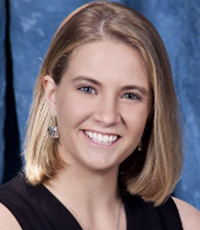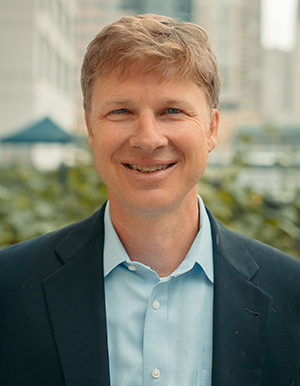
This day is especially close to my heart as we approach the official kickoff events for AFB’s new Blind Leaders Development Program, and we’re honored to feature Derek Shields on the AFB blog to ask him about his own experiences with mentoring.
Derek is president of ForwardWorks Consulting, LLC, and director of the National Disability Mentoring Coalition. We are delighted that he will be delivering the mentoring training for our inaugural class of mentors in the Blind Leaders Development Program. Derek, thank you for joining us on the AFB Blog in honor of National Mentoring Month.
Can you first tell us a little bit about the National Disability Mentoring Coalition – both its mission, and some of its core activities?
The National Disability Mentoring Coalition (NDMC) raises awareness about the importance and impact of mentoring in the lives of people with disabilities and aims to increase the number and quality of disability mentoring programs around the country. Established in December 2014 with 10 core members, NDMC transitioned in March 2018 to residing as an initiative of Partners for Youth with Disabilities (PYD). Today, NDMC has 70 organizations in our network of organizations providing inclusive mentoring experiences for youth, young adults and adults with disabilities.
NDMC spotlights the critical role of mentoring as a disability inclusion strategy that promotes successful academic, employment and independent living outcomes. We do this through facilitating communication among national stakeholders and sharing information about “what works” in disability mentoring. This happens in a variety of manners and formats, to include a collaboration with MENTOR: The National Mentoring Partnership in its effort to close the nation’s mentoring gap. We do all of this work by providing training, technical assistance, and a referral network to grow the number of mentors and strengthen the impact of mentoring experiences.
We invite you to learn more by visiting our NDMC website and visit the Hall of Fame.
In terms of National Mentoring Month and Thank Your Mentor Day, please share more about this annual campaign. And, importantly, is there a mentor you’d particularly like to thank, who helped you along the way?
Created in 2002 by the Harvard School of Public Health and MENTOR: The National Mentoring Partnership, National Mentoring Month is an annual designation observed in January to focus on how we can all work together to increase the number of mentors to make sure young people in our communities have dependable people to look to as role models and mentors. The month includes a variety of activities, events and campaigns, including the National Mentoring Summit in Washington, DC and Thank Your Mentor Day on January 30th. These activities are designed to close the mentoring gap in the nation and support youth and young adults in transition to educational opportunities and successful careers.
On January 30th individuals from around the country will share mentoring stories using the hashtag #ThankYourMentor. Personally, I like to share the story of Susan Daniels, a mentor of mine and an individual who devoted her life to improving the lives of people with disabilities. As a person with a disability who achieved enormous professional and personal success, she had significant impact as a senior policymaker, as an inspirational speaker and teacher, and as a devoted mentor to hundreds of individuals. Susan was my mentor and helped me to value getting to know people and their interests, motivations and objectives before jumping into the work itself. By centering relationships, Susan helped build collaborations that lasted. This is why we created the National Disability Mentoring Coalition, to bring like-minded organizations together. And it’s also why we honor Susan’s life and legacy the Susan M. Daniels Disability Mentoring Hall of Fame, showcasing the importance of relationships and their inclusion impact for both mentees and mentors.
So, on #ThankYourMentor Day, I thank Susan for all she did to help start me down this amazing path that has now led me to partnering with AFB and the participants of the 2021 Cohort of the Blind Leaders Development Program.
On a similar note, is there a mentee from whom you’ve learned as much as you’ve taught?
I love this question! I have learned too much from my mentees and appreciate the reverse and reciprocal mentoring that happens in all mentoring relationships. About six years ago I was matched with Daman Wandke through the Disability:IN NextGen Mentoring Program. Daman was grappling at the time with a career transition that would elevate his entrepreneurial spirit. I was able to assist Daman (along with others in his mentoring circle) in mapping out his network, career preferences and sorting priorities. In so doing, he started AbiliTrek, a travel and accessibility services consulting firm. Daman, in turn, taught me new methods for centering one’s priorities, leaping to what’s next, navigating communications with a communication disability, using humor to handle challenging situations, and more. What’s great about Daman and I is that we are still connected today, over six years later! While the formal mentoring program ended a long time ago, we both tapped a friend and associate for life. We have since partnered on a contract, consistently discuss development strategies, and continue to elevate each other’s entrepreneurial spirits.
What inspired you to participate as a mentoring trainer for AFB’s Blind Leaders Development Program?
When you reached out to me to discuss the embedding of mentors with the leadership development program I was immediately intrigued. Organizations that value mentorship and to center the value of personal relationships to help build confidence while building networks; those are organizations I want to collaborate with and support. Furthermore, the people behind the programs are clearly risk-takers that identified limitations in previous policies and practices. I believe that calculated investments in mentoring – and at times coaching and sponsorships – will help us move beyond our hindered employment outcomes and move people with disabilities into more leadership positions. This is an objective of the BLDP and it’s an objective of mine, so here we are working and learning together.
What are your goals for the new mentors?
Yes, having goals for the mentors is important. I tend to split the goal-setting into two categories, goals for learning about mentoring and goals for impact through mentoring.
First, we want to ensure the mentors understand mentoring models and approaches, the elements of effective practices in mentoring and how to craft mentoring plans. Then we will review mentoring techniques, review a networking model to share with the BLDP participants, share how to build a living portfolio. Importantly, we will also review how mentors can help new leaders to center storytelling and driving authentic narratives in all they do. Lastly, we want to ensure mentors learn ways to learn from mentees, including how to let mentees drive the relationship to meet their personal and career objectives.
Also, I’ll share with the mentors that I want to learn from them about their previous mentoring experiences, how networking helped each of them in their career advancements, and what works best in creating accessible mentoring experiences. Every training session is an opportunity for all of us to learn and move mentoring forward, together.
Closing Thoughts
Again, a huge thank you to Derek for sharing a Q&A with us on the AFB Blog.
According to MENTOR: The National Mentoring Partnership, the tough reality is that only one of three youth in the United States currently has a mentor outside of their home. The statistics for youth with disabilities are even lower. Further, despite progress made in disability rights over the past 30 years, individual and institutional ableism still exist.
While much of the research regarding mentoring for individuals with vision loss is focused on college-age students, there is strong evidence of mentoring having positive benefits at any age and disability status. In 2017, O’Mally and Stevenson* found that for college students, mentoring increased mentees’:
• Self-confidence
• Initiative in finding and obtaining job opportunities
• Self-sufficiency in obtaining employment
Disability remains highly stigmatized across youth- and adult-serving systems and institutions, and people with disabilities continue to be denied equal opportunity, access, and independence. To address these challenges, mentoring is a promising lever of opportunity for all.
- Source: O'Mally, J., & Steverson, A., (2017). Reflections on Developing an Employment Mentoring Program for College Students Who Are Blind. Journal of Visual Impairment & Blindness. 111(3):271-276.
Learn More:
Employment Programs for Blind and Low Vision Americans: What Are We Not Doing?
AFB Announces Inaugural Class of Blind Leaders Development Program Fellows
